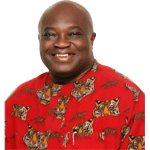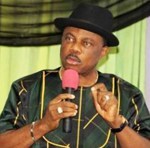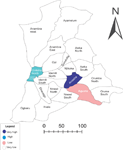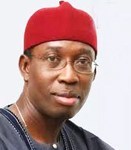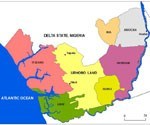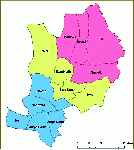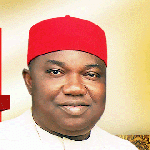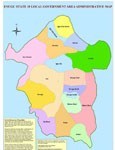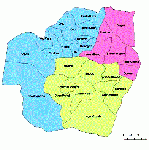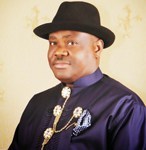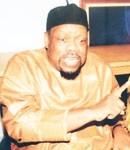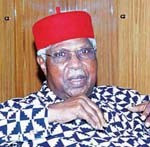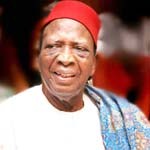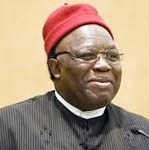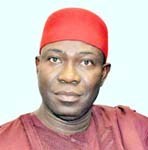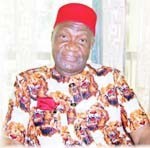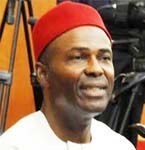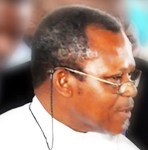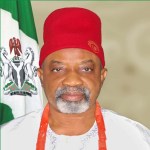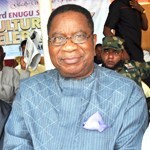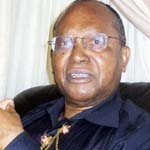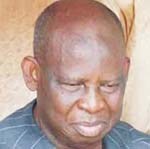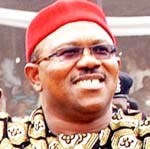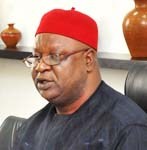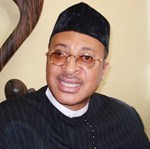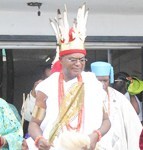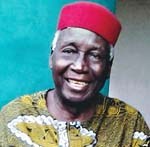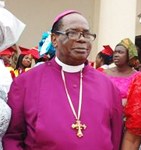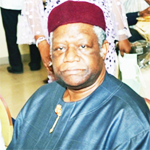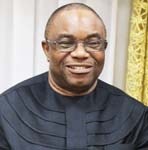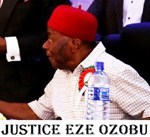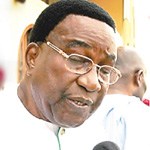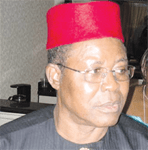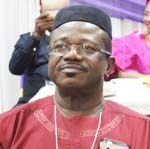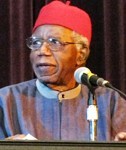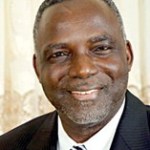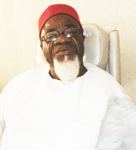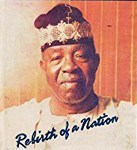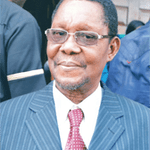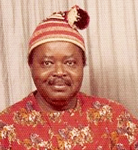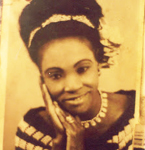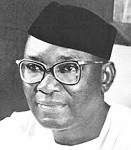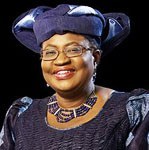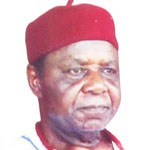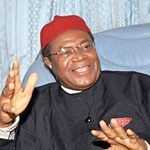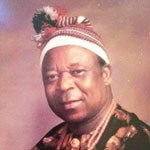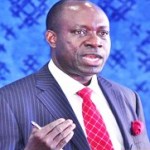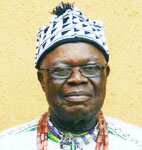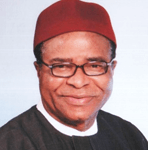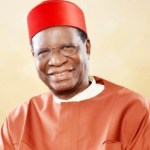Category:Igbo and the rest of Nigeria
THE President General of the apex Igbo social-cultural organization, Ohanaeze Ndi Igbo, John Nwodo, has said the pro-Biafra agitators, Indigenous People of Biafra, IPOB and MASSOB, by virtue of his position, are his children, and for this reason, if need be, he might even die for Ndi Igbo. He said: “As President General of Ohanaeze, I intend to extend my warm hand of paternity to IPOB and MASSOB. They are my children. I shall never desert them. Their struggle is my struggle even if we do not completely agree with their methods.” World Igbo Congress therefore calls on all Ndi Igbo to close ranks in order to own and protect our own. We cannot run away from our skin. See clips of what people are saying. WHAT DO YOU SAY? Let’s hear from you.
Fayose urges Buhari to release Kanu, others unconditionally
Ekiti State Governor Ayodele Fayose has called on President Muhammadu Buhari to order the unconditional release of leader of the Indigenous Peoples of Biafra (IPOB), Nnamdi Kanu, and other Nigerians who have been unjustly incarcerated like Sambo Dasuki, the ex-National Security Adviser (NSA) to former President Goodluck Jonathan.
In a statement in Ado-Ekiti yesterday by his Chief Press Secretary, Mr. Idowu Adelusi, he asked President Buhari to reciprocate the mercies of God upon his life by showing mercy on Kanu and the others.
He also advised that it would be wrong to reverse the gains we made under democracy, adding that the current peace in the Niger Delta and the slight improvement in the nation’s economy must be sustained.
He thanked God for the President’s return, which he said was all at the mercies of God, and particularly because Nigerians prayed for him.
His words: “It, therefore, behooves on you to show mercy on Kanu and Dasuki, who have been granted bail by the courts of competent jurisdiction, and such other Nigerians that are suffering unjust, punitive, illegal, and unconstitutional incarceration under this administration.
“Allow all those who have been granted bail by the court to enjoy their bail while their trial continues. This is the right, just, and merciful thing to do, especially now that your good self is looking up to God for mercy.”
Fayose, however, condemned some Igbo leaders who he said, were playing politics with Kanu’s continued incarceration and warned that his continued incarceration could be interpreted to mean hatred for the Igbo people.
Nnamdi Kanu: ECOWAS court dismisses fed govt’s objection
The ECOWAS Community Court of Justice dismissed a preliminary objection filed by the Federal Government of Nigeria challenging the jurisdiction of the court to hear a case of breach of fundamental human rights filed by Nnamdi Kanu.
In a ruling on Tuesday in Abuja, Presiding Judge, Justice Micah Wright, held that the court had jurisdiction to entertain the application.
Wright, ruled that the case was admissible.
The judge then adjourned till April 27 for continuation of hearing.
Kanu, the Director of Radio Biafra and Leader of Indigenous People of Biafra, is suing the Federal Government for alleged illegal detention.
Joined in the suit are the Attorney-General of the Federation and Minister of Justice and the Director-General of Department of State Services.
Kanu, in the suit, is seeking 800 million dollars compensation for violation of his human rights and an order directing his unconditional release and that of his personal belongings.
He is also praying the court to direct the defendants to respect, protect and promote his rights to life, liberty and freedom of movement, assembly and expression.
Kanu is also praying the court to declare that his arrest and detention since Oct. 14, 2015 by the defendants, is in flagrant disobedience to several orders of courts of competent jurisdiction.
He is also praying the court to declare that his continued detention is a violation of the African Charter on Human and Peoples’ Rights, the Universal Declaration of Human Rights, the United Nations Charter of 1970.
Kanu was arrested On Oct. 18, 2015 and subsequently detained by the DSS in Abuja.
He was , however , granted bail on Oct. 19, 2015 but was not released and had been in detention since.
On Nov.18, 2015, the Magistrate Court I , sitting in Abuja, ordered the DSS to produce Kanu, at the court on Nov. 23, 2015.
Kanu was finally arraigned on Nov. 23, 2015 in the court for the first time on charges of “criminal conspiracy, intimidation and membership of an illegal organisation” by the DSS.
MASSOB insists on Nnamdi Kanu’s release
The leader of Movement for the Actualisation of the Sovereign State of Biafra (MASSOB), Mr. Uchenna Madu, yesterday, urged Justice Binta Nyako of the Federal High Court in Abuja to quash the remaining five charges against the Leader of Indigenous People of Biafra (IPOB), Nnamdi Kanu.
Madu stated that Kanu and other Biafra agitators in detention did not commit any offence against Nigeria rather than agitating for independence, saying it is supported and backed by the United Nation’s universal declaration on self-determination.
The MASSOB leader in a statement said that Biafra agitation was only a reaction to the many injustices, exclusion, second class citizenship, born to rule philosophy, marginalisation and other forms of inequality that characterise the Nigerian state.
“We rejoice with our sister organisation, IPOB, over the discharge and acquittal of its members by the court. It is a triumph of light over darkness, of truth over lies and deceit. As we encourage all genuine pro-Biafra agitators to be steadfast, resolute and consistent, MASSOB also welcomes the striking out of the six charges against Kanu but insist that all the remaining count charges must be withdrawn because Nnamdi Kanu and others did not commit any offence against the Nigerian state,” he said.
Madu added: “MASSOB, IPOB, Lower Niger Delta, Biafra Peoples National Council (BPNC) and other Biafra agitating groups are not the problem. The Nigerian state as constituted is the major problem. Nigeria is a state where some are first class citizens while others are second class; a state where some are born to rule while others are perpetual outcasts; a state where state policy deliberately denies Biafra land critical developmental infrastructure while according others same; a state where prejudice, tribalism, exclusion and hate are elevated while nation building is ignored; and a state where it seems the only logic for unity is to share oil resources and not on the basis of consent, mutual respect, fraternity and shared brotherhood.
“For these reasons, true nationhood has remained stillborn, peace has remained elusive and Nigeria has remained in perpetual strife and ever increasing crisis since her founding. These undeniable realities are the reason the Nigerian state is afraid of Biafra and her agitators because we speak of a truth they cannot legitimately counter. We speak of a truth they know they are guilty of. So, out of weakness and fear, they resort to repression, persecution and detention.”
MASSOB warned that the “arrest and detention of Nnamdi Kanu and others at different prisons and DSS detention camps will not take away the problem; neither will it stop the struggle insofar as the conditions that birthed Kanu and other agitators remain. You cannot beat a child and ask the child not to cry. Arresting Nelson Mandela did not stop the Apartheid struggle; neither did arresting Kwame Nkrumah stop the independence struggle in Ghana. Such examples are evident all through history.”
Biafra: Release Nnamdi Kanu now – Soludo, Utomi, Igbo leaders tell Buhari
A Pan Igbo group, Nzuko Umunna, led by former Governor of the Central Bank of Nigeria, Prof. Charles Soludo, on Tuesday told President Muhammadu Buhari to immediately release the detained leader of the Indigenous People of Biafra, Nnamdi Kanu.
The group equally said Nigeria was becoming a failed state despite the fact that it has the potentials for greatness.
The position of the group was contained in a statement read on behalf of the members by Soludo at a news conference in Abuja.
The group said the Federal Government must obey court orders even when such orders appear unpalatable, including the one asking it to release Kanu on bail.
Others who signed the statement aside Soludo were Prof. Chidi Odinkalu, Ebere Onwudiwe, Law Mefor, Rev. Fr. C. Jude C, Emeka Ugwu-Oju, Ferdinand Agu and Tony Nnadi.
Others are Dr. Sam Amadi, Innocent Chukwuma, Collins Ugwu and Andy Wabali.
The statement reads in part: “We demand for the urgent release of Nnamdi Kanu, his colleagues and all prisoners of conscience, as part of the process of the search for national cohesion and building a new Nigeria. There is a legitimate debate among Nigerians on the Biafra question, and there are indeed many Igbos who, like many other Nigerians, do not agree with Nnamdi Kanu’s objective or means. It needs to be stated, however, that no citizen of Nigeria deserves the kind of treatment meted to him and his colleagues. Government has declined to obey the orders of properly constituted courts in Nigeria for his release. Nnamdi Kanu is not above the law; but, nor should he be put beneath it.
“A situation where the state refuses to obey legitimate court orders for his release and holds him until it gets a favorable order; moves the goalposts endlessly through endless amendment of the charges against him; and now seeking to try him in secret clearly constitutes circumstances that would fall well short of the constitutional guarantees of due process. These also would raise questions about our country’s adherence to human rights, the rule of law and transparent judicial process. We worry that there is now a clear design to place Kanu beneath the law and basic constitutional guarantees of due process. Without the rule of law, no sustainable economic progress can take place.
“The treasonable felony charge, which is now levied against Nnamdi Kanu has previously been used against Joseph Tarka and Obafemi Awolowo. His trial reminds us of the travails of these historic figures in our country and, indeed, of the more recent military-era treason trial of President Obasanjo. Not many people believe that Nnamdi Kanu and his colleagues can receive a fair trial based on the law. This makes Nnamdi Kanu and his colleagues political prisoners or prisoners of conscience.
“At various times in Nigeria’s history, it became expedient to release such prisoners (e.g. Obafemi Awolowo; Yakubu Gowon and Odumegwu Ojukwu, as well as President Obasanjo) as part of national reconciliation and nation-building. Nigeria is currently a country at war with itself. Our considered view is that, for taking extraordinary steps to draw international attention to Nigeria’s failing state and the urgency of actions, Nnamdi Kanu and his colleagues deserve to be engaged and not to be held interminably as political detainees.
“We demand that the right to freedom of association, assembly, peaceful protest, and expression must be accessible to all citizens of Nigeria as guaranteed by Nigeria’s constitution. Trying to criminalize anyone who talks about self-determination or attempts to use brute force to main and kill innocent protesters in a democracy is a strategy for a time that we no longer live in. This is 2017 and Nigeria is supposed to be a democracy! More than 200 years after 11 states in the US failed their secession bid, their Confederate flag still flies in several of them, even on government buildings.
“Since 2012, no less than 23 U.S. states had thousands of their citizens sign petitions to secede from the U.S. Currently, the State of California is still pressing for Calexit. There were protests all over the US following the election of Donald Trump. Similar examples can be cited in many democracies. But no one is killed, brutalized or incarcerated by the state.
“As a people, we believe that our country is big enough for diverse voices to be heard in the confidence that these voices in their respective ways seek to correct our imperfections; to have a stake in constructing a more perfect union. We convey our thanks to the Federal Government and the Acting President, Prof. Osinbajo for reaffirming recently that citizens have the right to peaceful protest, and we are happy that protesters were allowed to express themselves in Lagos, Abuja and other venues recently under police protection.”




